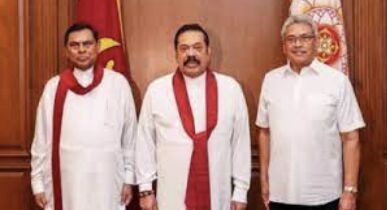Sri Lanka's Supreme Court Delivers Historic Verdict: Former President and Top Officials Found Guilty of Rights Violations, Plunging Economy into Unprecedented Crisis
Sri Lanka's Supreme Court has found former president Gotabaya Rajapaksa and other senior officials guilty of mishandling the economy, leading to an unprecedented economic crisis. The ruling brings accountability and justice to the nation's financial woes.
In a groundbreaking ruling, Sri Lanka's Supreme Court has found former president Gotabaya Rajapaksa, ex-prime minister Mahinda Rajapaksa, former finance minister Basil Rajapaksa, and other senior officials guilty of violating the fundamental rights of the people and mishandling the economy, resulting in an unprecedented economic crisis. The court's decision comes after intense protests and the declaration of economic bankruptcy by Sri Lanka in April 2022, marking its first-ever sovereign default. The island nation has been grappling with the worst financial crisis in its history, with foreign exchange reserves plummeting to critical levels and the public taking to the streets to protest the shortages of essential commodities, fuel, and fertilizers.
Transparency International, Sri Lanka, along with four other activists, filed a petition in 2022, leading to this landmark ruling. A five-member bench of the Supreme Court, in a majority 4-1 ruling, held the respondents accountable for economic mismanagement between the years 2019-2022. Former Central Bank of Sri Lanka governors Ajith Nivard Cabraal and WD Lakshman, as well as ex-secretaries to the Treasury PB Jayasundera and SR Attygalle, were also found guilty of rights violations. The petitioners had argued that tax concessions worth SLR 681 billion granted to businesses by Gotabaya Rajapaksa during his presidency were a significant factor behind the economic downturn.
The court also highlighted other mismanagement actions, such as pegging the USD at Sri Lankan Rupee 203, delaying the approach to the International Monetary Fund for aid, and honoring a USD 500 million international sovereign bond payment amid the looming forex crisis. The petitioners sought a court declaration that the mishandling of the economy by these responsible individuals had violated the fundamental rights of the people.
While the court did not grant financial compensation requested by the petitioners, it ordered the respondents to pay the petitioners' legal costs of Rs 150,000 each. Sri Lanka, burdened with a foreign debt of USD 46.9 billion, has faced significant repercussions due to this economic crisis. Following the protests and the nation's deteriorating conditions, Mahinda Rajapaksa resigned in May 2022, while Gotabaya Rajapaksa stepped down in July. Former finance minister Basil Rajapaksa had already resigned in June of the previous year.
Transparency International, Sri Lanka, stated in a press release that the petition was filed in the public interest to address the lack of accountability and transparency in high-level decision-making that has brought the country to its knees. The actions and inaction of the respondents have led to severe shortages of food, medicine, fuel, and gas, victimizing the entire population in an unprecedented manner. This landmark ruling serves as a significant step towards accountability and justice in Sri Lanka's economic crisis. The findings of the Supreme Court underscore the importance of responsible governance and transparency in avoiding the severe consequences witnessed by the nation.




